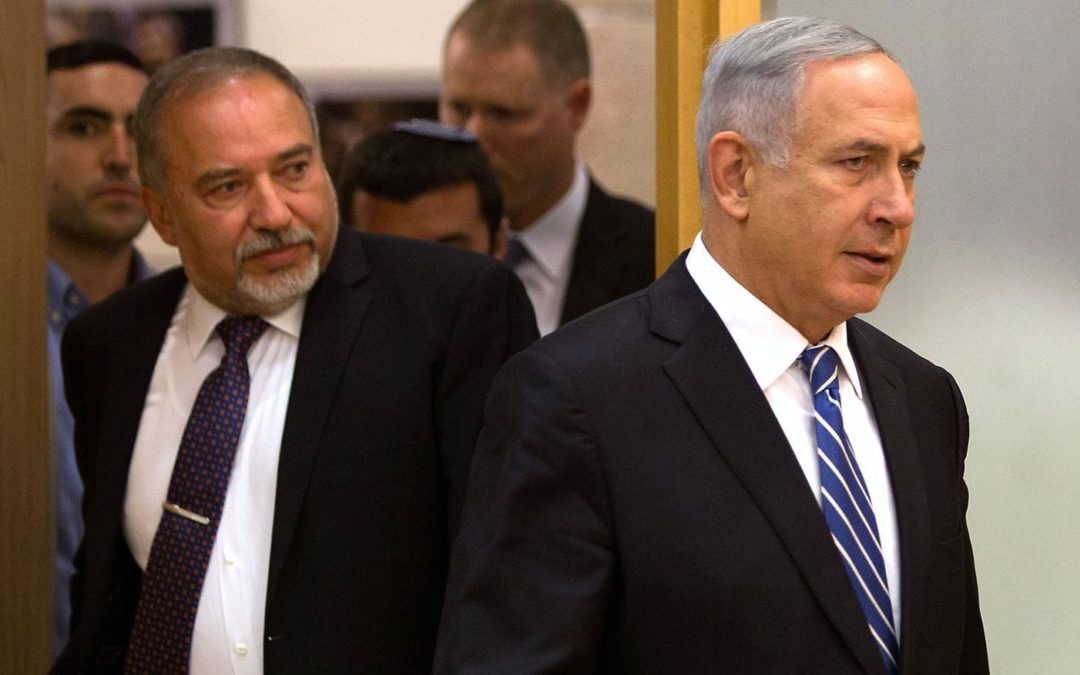JERUSALEM — Israeli Prime Minister Benjamin Netanyahu has a reputation as a slick political negotiator, but just a day away from his deadline to form a new government, he is floundering, raising the prospect of new elections.
The thorn in his side is Avigdor Liberman, his former defense minister with whom the Israeli leader has had a tempestuous history.
Netanyahu needs Liberman, whose party holds five seats in the 120-seat parliament, known as the Knesset, to form a majority after coming out ahead in Israel’s April 9 elections. Without those five seats, his coalition of right-wing and religious parties hold just 60.
But at the moment, the two are at loggerheads as Netanyahu faces the challenge of balancing the demands of the ultrareligious parties, which he needs as partners and which increased their number of seats in the elections, with those of fiercely secular Liberman. Liberman is insisting on the passing of a law drafting the ultra-Orthodox into the military.
While previous coalition negotiations have come down to the wire, analysts say this time is different, with no coalition agreements finalized and partners trying to leverage Netanyahu’s weakness as he attempts to form a government that will protect him from looming criminal charges. Netanyahu’s pre-indictment hearing on charges of corruption, breach of trust and bribery is scheduled for October.
Under Israeli law, if Netanyahu can’t form a government, Israeli President Reuven Rivlin is tasked with appointing another candidate to do so. However, that scenario would leave Netanyahu unable to shield himself from prosecution, analysts say, while his main rival also has no clear path to a coalition. So instead, his Likud party has forwarded a bill to dissolve the Knesset, paving the way for new elections if Netanyahu can’t form a government by Wednesday.
“This is new for Israel,” said Reuven Hazan, a politics professor at Hebrew University. “We’ve never tried to form a government and bring down a new parliament at the same time.”
The bill to dissolve parliament passed its first reading at the Knesset on Monday by 66 to 44 votes, despite objections by Benny Gantz, the leader of Israel’s Blue and White party, the second largest in parliament. Gantz argued that he should be allowed a chance to form a government.
“There is no reason to waste billions of shekels when the solution is in front of us,” he said Monday. However, it is also unclear how Gantz could form a coalition.
[Trump peace package for Middle East likely to stop short of Palestinian statehood]
New elections have the potential to delay both the White House’s long-awaited peace plan and Netanyahu’s October hearing, said Israeli political analyst Dahlia Scheindlin. “He doesn’t want elections, but he doesn’t want the worse situation of someone else forming a government,” she said, adding that with the peace plan and the indictment hearing “closing in,” there might be an upside for him.
The release of a political plan for peace with the Palestinians could raise difficulties for Netanyahu, whose potential right-wing government has little room for compromise.
The White House announced Tuesday that President Trump’s son-in-law Jared Kushner would travel to the region this week for discussions ahead of the first step of the plan’s rollout, which takes place in June with an economic workshop in Bahrain. A Knesset committee gave Sept. 17 as a preliminary date for new elections.
“Hoping things will work out with Israel’s coalition formation and Bibi and I can continue to make the alliance between America and Israel stronger than ever,” Trump tweeted Monday, using Netanyahu’s nickname. “A lot more to do!”
Liberman has put his refusal to join the government, after initially recommending Netanyahu to lead it, down to a dispute over the law that sets annual enlistment targets for drafting members of Israel’s ultra-Orthodox community into the military and imposes penalties on yeshivas if their targets aren’t met.
Many ultra-Orthodox protest the fact that they should even be required to gain an exemption not to serve. Issues of state and religion would no doubt be sources of constant friction with the ultrareligious parties holding 16 seats in parliament, but the crisis is about much more than the army draft law, said Hazan.
“This is about Liberman and Netanyahu, personalities and power,” he said, adding that what remains unclear is how much the threat of new elections is Netanyahu “flexing” and whether he will be able to turn around the talks at the last minute.
Liberman has appeared resolute, describing it as a “principled stand,” and said he would support fresh elections.
Speaking to the Knesset, Netanyahu stressed the urgency of forming a coalition.
“Everyone understands this, including my friend U.S. President Donald Trump,” he said, insisting that there was still time to form a coalition. There were “endless” important tasks at hand, he said, including “strengthening settlements” and security challenges.
Scheindlin said she still believes it is likely that Netanayhu will find a way to form a coalition by Wednesday, but “anything could happen.”
“In the past, we’ve had a lot of brinkmanship,” she said. “At this point, the brinkmanship appears to have taken on a life of its own.”
Read more
Netanyahu’s supporters push a bill to give him immunity as indictments loom
Israel’s Netanyahu, facing indictment, sets out to build a coalition that will stand by him
Israel’s hawkish defense minister resigns from the government over Hamas truce
Today’s coverage from Post correspondents around the world
Like Washington Post World on Facebook and stay updated on foreign news
